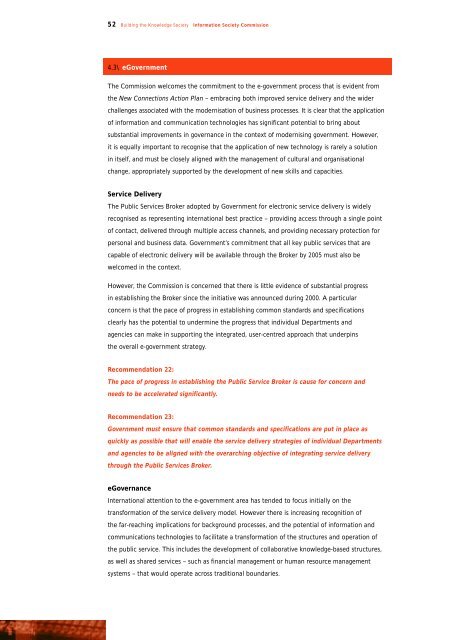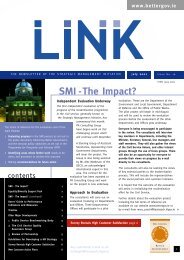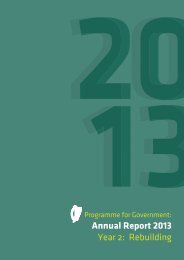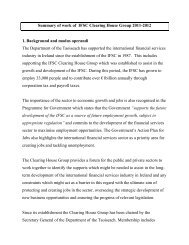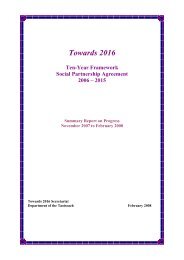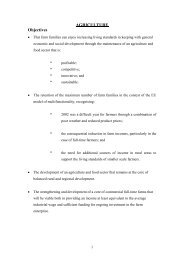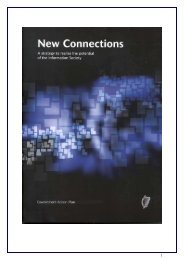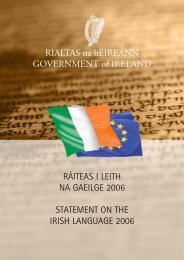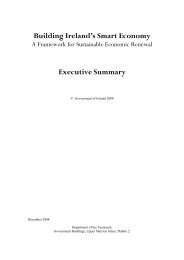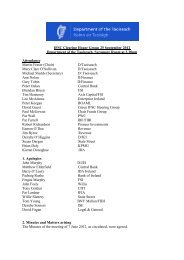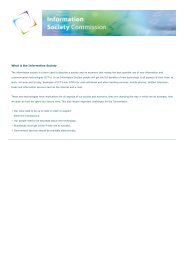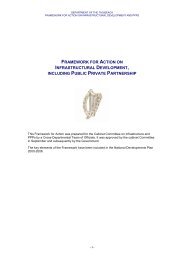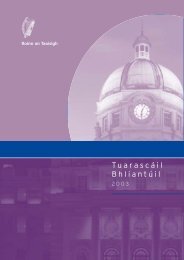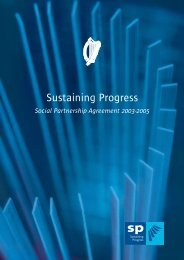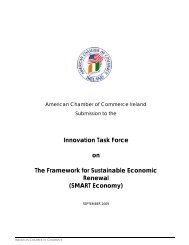Building the Knowledge Society - Department of Communications ...
Building the Knowledge Society - Department of Communications ...
Building the Knowledge Society - Department of Communications ...
You also want an ePaper? Increase the reach of your titles
YUMPU automatically turns print PDFs into web optimized ePapers that Google loves.
52 <strong>Building</strong> <strong>the</strong> <strong>Knowledge</strong> <strong>Society</strong> Information <strong>Society</strong> Commission4.3\ eGovernmentThe Commission welcomes <strong>the</strong> commitment to <strong>the</strong> e-government process that is evident from<strong>the</strong> New Connections Action Plan – embracing both improved service delivery and <strong>the</strong> widerchallenges associated with <strong>the</strong> modernisation <strong>of</strong> business processes. It is clear that <strong>the</strong> application<strong>of</strong> information and communication technologies has significant potential to bring aboutsubstantial improvements in governance in <strong>the</strong> context <strong>of</strong> modernising government. However,it is equally important to recognise that <strong>the</strong> application <strong>of</strong> new technology is rarely a solutionin itself, and must be closely aligned with <strong>the</strong> management <strong>of</strong> cultural and organisationalchange, appropriately supported by <strong>the</strong> development <strong>of</strong> new skills and capacities.Service DeliveryThe Public Services Broker adopted by Government for electronic service delivery is widelyrecognised as representing international best practice – providing access through a single point<strong>of</strong> contact, delivered through multiple access channels, and providing necessary protection forpersonal and business data. Government’s commitment that all key public services that arecapable <strong>of</strong> electronic delivery will be available through <strong>the</strong> Broker by 2005 must also bewelcomed in <strong>the</strong> context.However, <strong>the</strong> Commission is concerned that <strong>the</strong>re is little evidence <strong>of</strong> substantial progressin establishing <strong>the</strong> Broker since <strong>the</strong> initiative was announced during 2000. A particularconcern is that <strong>the</strong> pace <strong>of</strong> progress in establishing common standards and specificationsclearly has <strong>the</strong> potential to undermine <strong>the</strong> progress that individual <strong>Department</strong>s andagencies can make in supporting <strong>the</strong> integrated, user-centred approach that underpins<strong>the</strong> overall e-government strategy.Recommendation 22:The pace <strong>of</strong> progress in establishing <strong>the</strong> Public Service Broker is cause for concern andneeds to be accelerated significantly.Recommendation 23:Government must ensure that common standards and specifications are put in place asquickly as possible that will enable <strong>the</strong> service delivery strategies <strong>of</strong> individual <strong>Department</strong>sand agencies to be aligned with <strong>the</strong> overarching objective <strong>of</strong> integrating service deliverythrough <strong>the</strong> Public Services Broker.eGovernanceInternational attention to <strong>the</strong> e-government area has tended to focus initially on <strong>the</strong>transformation <strong>of</strong> <strong>the</strong> service delivery model. However <strong>the</strong>re is increasing recognition <strong>of</strong><strong>the</strong> far-reaching implications for background processes, and <strong>the</strong> potential <strong>of</strong> information andcommunications technologies to facilitate a transformation <strong>of</strong> <strong>the</strong> structures and operation <strong>of</strong><strong>the</strong> public service. This includes <strong>the</strong> development <strong>of</strong> collaborative knowledge-based structures,as well as shared services – such as financial management or human resource managementsystems – that would operate across traditional boundaries.


